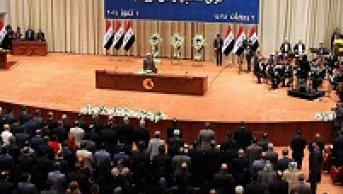History and Legal Dimension of Turkish Education in Iraq

During the time when the Ottoman Empire ruled over today's Iraqi territory, education was as a matter of course in Turkish, mainly in the Turkmen regions. Education was carried out in this period in mosques and Islamic monasteries. The given situation continued for a while after the British invaded Iraq (1918) and the Iraqi State was established (1921). In those years, education was conducted in Turkish in primary schools in Kirkuk, which was a then-Turkish city, and in other Turkmen regions; however, an Arabic course was added in the syllabus. In 1927, Arabic served as the primary language in the fifth and sixth grades in these schools while Turkish education was still in effect in the first four years. At the high school level, education started to be given in Arabic.
The British occupying Iraq following the World War I and subjecting it to the mandate regime did not hesitate to make any kind of effort to erase Turkish presence, culture and history in Iraq. In this context, they attempted to implement their plans which aimed at abolishing Turkish education and replacing it with Arabic by putting pressure upon the Iraqi Government.
It is interesting to note that during the mandate regime (1921-1932) two laws were introduced in Iraq that allowed Turkish education in a limited way. The first of these was the "Local Languages Law", which took effect in 1931 and the second was the "Declaration of the Kingdom of Iraq", which was declared by the Iraqi Government in 1932.
In Article 6 of the Local Languages Law numbered 74 adopted in 1931 regarding Turkish education, it was emphasized that in kindergartens and elementary schools in the provinces of Mosul, Erbil and Kirkuk where the majority of the students were Turkish, the education language was to be Turkish.
The "Declaration of the Kingdom of Iraq", signed in 1932 by Prime Minister Nuri al-Said was a commitment letter for the removal of the mandate given to the League of Nations. Article 5 of the Declaration stressed that the Iraqi people belonging to different religions, languages and ethnicities had the right to open schools and educational institutions in order for them to use their own languages. Article 8 of the Declaration pledged that the children of the citizens whose native languages were not Arabic and who were present in the provinces and districts would have the right to receive education in their own languages in primary schools in accordance with the educational systems of the country, and required conditions would be prepared for it.
It was declared in the same Declaration that the rights and commitments given to national and ethnic groups were international obligations under the guarantee of the League of Nations.
Indeed, the given Law and Declaration were enacted entirely for political reasons, not because the ethnic groups in Iraq were believed to have the right to be educated in their own languages. The League of Nations stipulated that Iraq should be committed to providing its citizens with the given rights so that the League could recognize the full independence of the Iraqi state and that Iraq could become a member of the League. Therefore, the rights granted to the Turkmen and other ethnic and religious groups by the Law were given for these reasons. Indeed, the right granted to Iraqi Turkmens to "be educated in their own language", was taken away from their hands in a short while. In 1935-1936, the right to Turkish education was cancelled in all Turkmen regions except Kirkuk, Turkish education was recognized as only one course in Kirkuk, and even this right was taken away afterwards, and the language of education completely became Arabic.
This continued in the royal period (1925-1958). Article 3 of the temporary constitution dated 1958, which was published shortly after the collapse of the Kingdom and the proclamation of the Republic, contained the claim that Arabs and Kurds were a common citizen and that their national rights would be protected; hence, Turkmen people in Iraq were ignored. Of course, from that time on, Turkish continued not to be a language of education.
The interim constitution issued immediately after the Baath Party's coming to power in Iraq (1968) guaranteed the rights of Arab and Kurdish peoples like the previous constitution, and ignored the Turkmen people, the third major formation in Iraq. As a political result of this, a brutal assimilation and Arabization policy were imposed upon Turkmen people in the country.
However, almost two years after the given date, on January 24, 1970, the “Revolutionary Command Council" which had the power in Iraq, surprisingly issued a resolution on the recognition of "cultural rights to Turkmens". According to this resolution numbered 89, it was decided to teach "Turkmen language" at the level of primary education in Turkmen regions, to prepare all educational tools in Turkmen language and to establish a Directorate of Turkmen Education in the Ministry of Education.
Immediately after this resolution, Turkmen began to be offered instead of Arabic in primary schools in the Turkmen regions. Approximately 120 schools in Kirkuk, the centre of Turkmen people, began to teach in Turkmen and this situation was greatly welcomed by Turkmen people. The curriculum began to be translated from Arabic to Turkish (Turkish in Arabic alphabet), the books in Turkish began to be published and courses were given for teachers to adapt themselves to this new system. In addition, the names of the schools that started teaching in Turkmen were changed and Turkish names were used (Yıldızlar, Yedi Kızlar, Fuzuli, Karaaltun, Gerçek). In addition to Kirkuk, in Turkmen regions such as Erbil, Tuz Khurmatu, Tal Afar, Altun Kupri, Daquq, the primary schools that taught in Turkmen also became rapidly active.
Unfortunately, this right granted to Turkmen people was taken back by the regime after a short period lasting two years, and all schools were reintroduced into the Arabic education system. Turkmen people, however, did not remain silent before the very decision of the regime, protests started throughout the Turkmen regions, all schools went on strike including the high schools, and all the schools were closed for three days. Civil servants and self-employed people also participated in the protests. As a result, dozens of students and teachers were arrested by the regime and were subjected to severe torture. Hüseyin Demirci, known for his nickname " Tembel (Lazy) Abbas", was tortured and murdered. Thus, the efforts of Iraqi Turks for Turkish education ended tragically.
Indeed -as what took place two years later demonstrated, the Baath Party was never sincere about giving the Turkmen people the right to receive education in Turkish. Then by, it turned out that the very reason behind the fact is this: The United Nations imposed an obligation by a resolution dated 1965 that member states of the union shall not discriminate against their citizens on religious, lingual, ethnic or national grounds. The United Nations made the principles including this obligation an international document and this document entered into force in the first months of 1969. Iraq was one of the countries that signed this international document in the given year. The parliaments of the member countries began to approve this document one by one. As to Iraq, the Revolutionary Command Council approved the said document by a decree law dated 14 January 1970. According to this decree law, Iraq made a commitment not to resort to discrimination among her citizens before the United Nations Delegation and international community. Only ten days after this step taken, on January 24, 1970, the resolution of the "Recognition of Cultural Rights to Turkmens" was issued. The Iraqi Government sent a copy of the resolution to the United Nations Secretariat; then, a similar decision was approved for Assyrians; and on March 11, a resolution granting autonomy to the Kurds was issued. After this stage, Turkish education was not offered by the state for the next 33 years in Iraq.
After 1992, schools teaching in Turkish started to come into service in Erbil which had become a part of the safe zone declared by the USA after the Iraqi invasion of Kuwait. In this period, twelve primary schools and five kindergartens were opened by Turkmen parties in Erbil and education continued in Latin alphabet.
In 2003, Iraq was occupied by the USA and a new governing style was established in the country.
Taking advantage of the lack of governance, Iraqi Turkmens carried out a fait accompli and opened primary schools in the 2004-2005 academic year and even before that, without any approval from the Ministry of Education of Iraq. Because of the fact that there were no or very few teachers who could teach Turkish, Turkmen men of letters, historians and poets took the responsibility of teaching. This gap was filled by teachers’ being sent to Turkey and joining in training courses. The Iraqi Ministry of Education first objected to the opening of these schools and opposed them. Thereafter, these schools and diplomas given to students were recognized by the state.
For the first time in the Iraqi history, the existence of the Turkmen people was emphasized in the Constitution entering into force in 2005, and the right to receive education in its own language was granted to this formation. Article 4 of the Constitution guarantees the right of Turkmens to receive education in their own mother tongue. Article 125 of the Constitution has once again reinforced the issue of guaranteeing the educational rights of Turkmens. After these dates, primary, secondary and high schools which provided education in Turkmen proved themselves and even recorded superior achievements in the country. Currently, the Turkmen schools in Kirkuk, Erbil, Tuz Khurmatu, Diyala and Baghdad continue to serve. It is also worth emphasizing that the Turkish education in these schools is offered in two ways: All the courses are in Turkish in the schools called Esas; in the schools called şümul there exists only one Turkish training course, and all others are taught in Arabic.
Another law that accelerated the Turkish education issue in Iraq was "the Ministry of Education Law". In accordance with this law made in 2011, the General Directorate of Turkmen Education was established within the body of the Ministry. This General Directorate and the Turkmen Directorate of Education in Kirkuk continue to perform significant services in this area.
The Law of Official Languages which entered into force in Iraq in 2013 also gave strength to Turkmen education. Article 7 of the Law emphasizes that Turkmen schools can be opened at all stages of education; Article 9 states that Turkmen is the official language in the regions where Turkmens constitute the majority of the population, and Article 14 clarifies this issue and recognizes the right of every Iraqi to open a faculty, institute, cultural centre and language institution in order to serve their language and culture. Iraqi Turkmens will be able to protect their language, culture and traditions on account of the Turkish education provided to their children.










